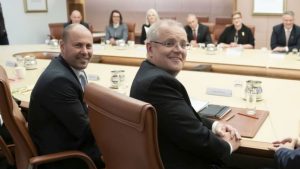Home » Commentary » Opinion » ‘Miracle man’ faces economic reform test
· The Canberra Times

 We’ve recently been hearing the term “miracle election” after the May poll result, but Australia has long been described in terms of another “miracle” – an economy that has enjoyed 27 years of growth.
We’ve recently been hearing the term “miracle election” after the May poll result, but Australia has long been described in terms of another “miracle” – an economy that has enjoyed 27 years of growth.
However, the economic miracle is looking a bit ragged after another sluggish quarter.
There is still growth, but barely enough to match population expansion, and not enough to stop unemployment from rising.
“There is still growth, but barely enough to match population expansion, and not enough to stop unemployment from rising.”
Our miraculously re-elected economic managers have already received a barrage of advice – including from the Reserve Bank Governor, no less – that they must turn their attention to structural reforms to rev up the economy.
Structural reform is economic jargon for permanent changes in the government’s taxation, expenditure and regulatory policies designed to lift investment, productivity, real wages and living standards to a higher level.
The structural reforms most advocates have in mind are taxation (such as broadening or increasing the GST and reducing income tax); infrastructure (provided the projects are selected on economic, not political grounds); education and training; federal-state relations; industrial relations; energy supply and cost; competition; and regulation more generally (cutting red tape).
That is all very well. A concerted effort along these lines would end the reform drought of the past 10-20 years.
The economy would benefit as it did from the last burst of structural reform in the 1980s and 1990s.
Real wages and living standards would be higher, and the domestic economy would be more resilient in the face of any weakness in the global economy.
However, a dose of reality is needed. Structural reforms work slowly and their full benefits are not felt for many years.
It would be a mistake to think of them as a short-term stimulus in the event of a recession.
There are also political obstacles to be overcome in implementing structural reforms.
The electorate has not been prepared for policies that many voters would find confronting.
The Morrison government was not re-elected for singing from the structural reform song-sheet. In fact, it ruled out several items that often appear on the reform menu, including industrial relations reform and various taxation measures such as tax cuts for large companies.
The government also has to negotiate legislation through a Senate that – although less of an obstacle than it was in the last parliament – is still difficult.
Even if Morrison was willing to do a somersault on the GST, it is difficult to imagine any increase or broadening getting through the Senate.
Furthermore, some reforms would require the cooperation of the states and territories.
Getting agreement on reforms among nine governments can be like shepherding unruly felines.
The Howard government’s experience in introducing the GST is a sobering example of how difficult fundamental reform can be.
It took an election that Howard almost lost, followed by difficult negotiations with the states and then in the Senate.
The outcome was a package different from the one Howard started with.
For all these reasons, it is not surprising that Morrison and Frydenberg give every impression of wanting to cover their ears to the barrage of advice they are receiving on structural reform.
The top priority for them is implementing the limited program they ran on in the election, starting with the roll-out of personal income tax cuts over five years.
The nation will be the poorer for the lack of an adventurous approach to reform.
But, just as the benefits of reform take a long time to show up, the costs of not doing it also take a long time to become apparent.
It may take an economic crisis of some kind to jolt the political system into action, but even then, don’t count on it.
In the meantime, provided the world economy doesn’t fall into a hole, the Australian economy is likely to continue plodding along and reaping the benefit from any upsurges in global commodity prices that come our way.
But if the world economy does fall into a hole, this time we are likely to fall with it.
Robert Carling is a Senior Fellow at the Centre for Independent Studies.
‘Miracle man’ faces economic reform test